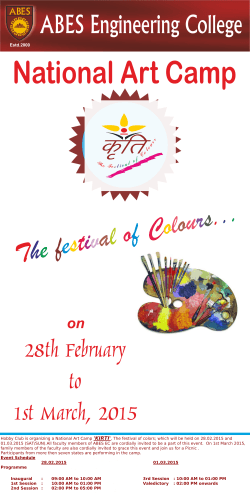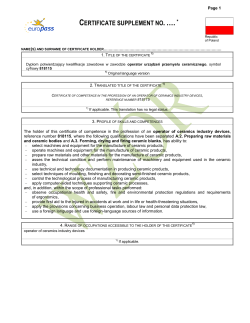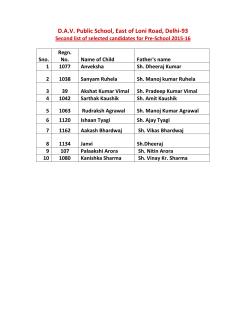
1st National Workshop On Nanotechnology for Electro
1st National Workshop On Theme: Nanotechnology for Electro-ceramics Date: 27th - 28th March 2015 Venue: ABOUT THE DEPARTMENT The Founder of Banaras Hindu University Mahamana Pandit Madan Mohan Malviya started a course in Ceramics as early as in 1924 as a section in the Department of Industrial Chemistry and established Department of Glass Technology & Department of Ceramic Technology. In 1956 these two departments were merged into Department of silicate Technology. In 1968 the department was renamed as Department of Ceramic Engineering. The department is having all the sections of traditional ceramics such as pottery, porcelain and white-ware, cement, refractories, glasses, enamels and furnace technology. The department is committed for the rapid advancement in frontier areas of ceramic engineering in terms of teaching and research in special glasses, new generation refractories, cements and castables, electrical and electronics ceramics, bioglasses, bio-glass ceramics, advanced ceramics and for pursuing active research in these emerging areas. The department has added new sections in advanced ceramic areas such as electro-ceramics, glass-ceramics, bioceramics and ceramic composites. Many R&D projects have been sponsored by AICTE, DST, CSIR, DRDO and UGC. The department celebrated its Platinum Jubilee during 1999 for 75 years of Ceramic education. Department of Ceramic Engineering, Indian Institute of Technology, (I.I.T.) – B.H.U. Banaras Hindu University, Varanasi – 221005, Uttar Pradesh (U.P.), INDIA Organized By: Indian Ceramic Society, Student Chapter THE THEME We are pleased to warmly invite you to the 1st National Workshop on Advanced Ceramics in the field of Nanotechnology for Electro-ceramics. Research and development in the field of electroceramics is driven by technology and device applications. It includes research on a broad spectrum of inorganic materials, and it covers all scales from the level of the crystalline lattice to that of final devices. The applications find a place in an increasing number of domains, ranging from environment monitoring and transportation, through medicine and health-care, to electronics and communications. Two tendencies are emerging: surface and interface phenomena play an increasingly important role, motivated by the interest to integrate electroceramic functions into microelectronics and MEMS technologies as well as by the evolution of bulk products from discrete components into materials systems. With the emergence of nanotechnology, MEMS, smart materials and next generation of sensors, the field of electroceramics has taken centre-stage. The continued growth of these areas will critically depend on the availability of novel electroceramics. Electroceramics are following conventional semiconductors with respect to down-scaling. Nanosize effects, nanotechnology related processes, and the use of new characterization techniques to reveal nanometric scale features are therefore gaining in importance. Important steps in producing particular nano/microstructures by innovative synthesis allowed recent studies on size, shape and interface-driven mesoscale phenomena, whereas new experimental techniques and modeling tools provided a deeper processing-structure-property understanding. The resulted emergent properties opened new application routes and industrial implementation of electroceramic materials. The actual situation stands for a challenge to the ELECTROCERAMICS community that needs to adapt and re-define its identity to establish new synergies with other important groups in the field of advanced materials in close connection with new trends and industrial needs. Recent research in electroceramics and evolving trends for the future will discuss in the context of these issues. All along this workshop will prove to be among the most active interdisciplinary forums for promoting and discussing major results in fundamental and applied research in the field and offered new ideas and solutions, proposed emerging trends and opened new research areas. This workshop aims to provide a solid learning platform for the teaching faculties, students and researchers from the industries in the field of “Nanotechnology for electroceramics”. At the end of the workshop, we expect the participants to get very good grasp of the recent advances in current electroceramics field. EXPECTED OUTCOMES OF THE WORKSHOP This workshop shall provide an opportunity for recent research in electroceramics and evolving trends for the future. Participants shall acquire experience in discussing major results in fundamental and applied research in the electro-ceramic field. IMPORTANT DATES Receipt of Application: 18/03/2015 Intimation of Selection: 20/03/2015 REGISTRATION FEE AND PAYMENTS Academician/Faculty/Practitioner Research/PhD Scholars Student (M.Tech./B.Tech.) Delegates (Industries/Others) 1. 2. 3. 4. Dr. A. K. Ghosh, B.H.U. Dr. N. Harish Kumar, I.I.T. – Madras Dr. Bholanath Pal, I.I.T. – B.H.U. Dr. L. K Sharma, CGCRI - Khurja, U.P. INR 2000/INR 1500/INR 1000/INR 3000/- Registration on first-come-first-serve basis in view of limited seats. FACULTY MEMBERS Academician/Scientist: REGISTRATION FORM Registration fee: TRAVEL AND ACCOMODATION No TA/DA will be provided. Accommodation will be given in Guest house or college Hostels. The applicable charges will be borne by the selected applicant. Name : Designation : Department : Address : Phone : Email : Accommodation required : YES/NO Industrialists: 1. Dr. Sudhakar Reddy, Technical Director - Raychem Innovation Center, Raychem RPG (P) Ltd., Gujarat 2. Dr. Rajendra Jaiswal, Team Head - R&D, Pidilite Industries Limited, Mumbai AGENDA Day 1: 01:00-01:15 01:15-01:30 01:30-02:00 02:00-02:30 02:30-03:00 03:00-04:30 04:30-06:00 06:00-08:00 pm pm pm pm pm pm pm pm Registration Lighting of the Lamp, Kulgeet Welcome Address by HOD Address by the Patron High Tea Dr. Sudhakar Reddy Dr. L. K Sharma Cultural Function Day 2: 09:00-09:30 09:30-11:00 11:00-12:30 12:30-02:00 02:00-03:30 03:30-05:00 05:00-05:30 05:30-06.00 am am pm pm pm pm pm pm High Tea Dr. A. K. Ghosh Dr. N. Harish Kumar Lunch & Networking Dr. Bholanath Pal Dr. Rajendra Jaiswal High Tea Valedictory Function/Address ORGANIZING COMMITTEE Patron Chairman Convener Co-Convener Secretary Treasurer Advisory members : Prof. Rajeev Sangal : Prof. Ram Parye : Dr. Pradip Kumar Roy : Prof. Om Prakash : Prof. Devendra Kumar : Dr. Anil Kumar : Prof. S. P. Singh; Dr. V. K. Singh; Dr. M. R. Majhi For more information contact: Dr Pradip Kumar Roy Assistant Professor, Department of Ceramic Engineering, Indian Institute of Technology (I.I.T.) - B.H.U., Banaras Hindu University, Varanasi - 221005, Uttar Pradesh (U.P.), INDIA. Email Id: pkroy.cer@itbhu.ac.in PAYMENT DETAILS DD No : Dated : Name of the bank : Date: Signature: pradip.nitrkl@gmail.com (Note: This form may be photocopied for additional requirement)
© Copyright 2025










